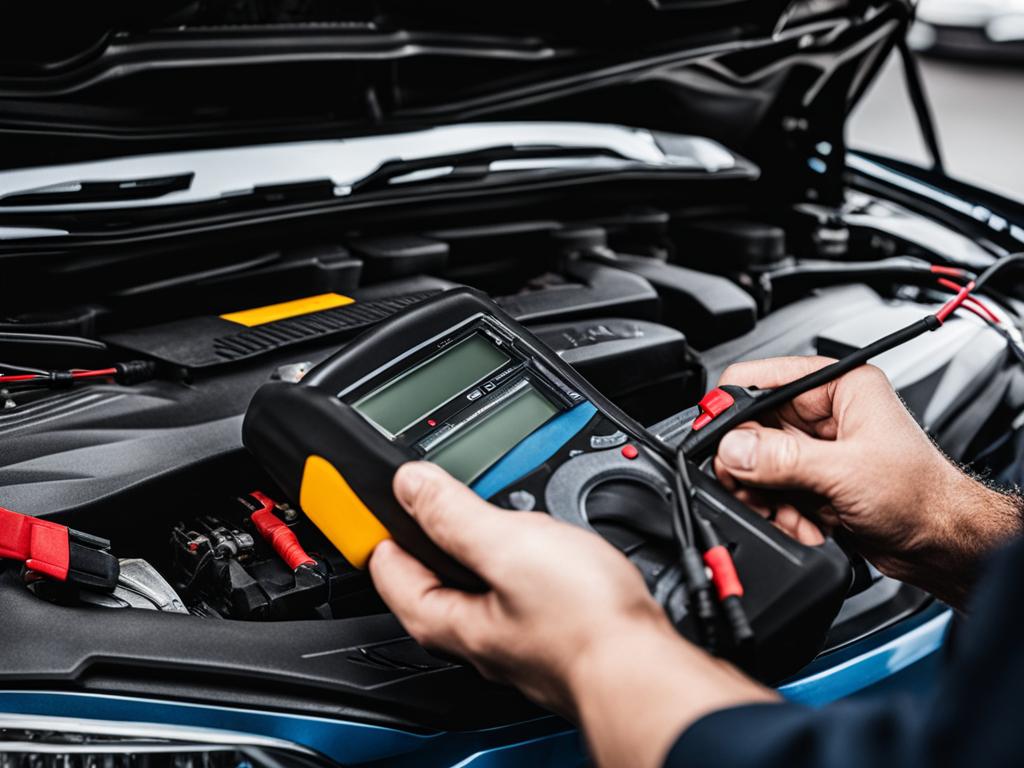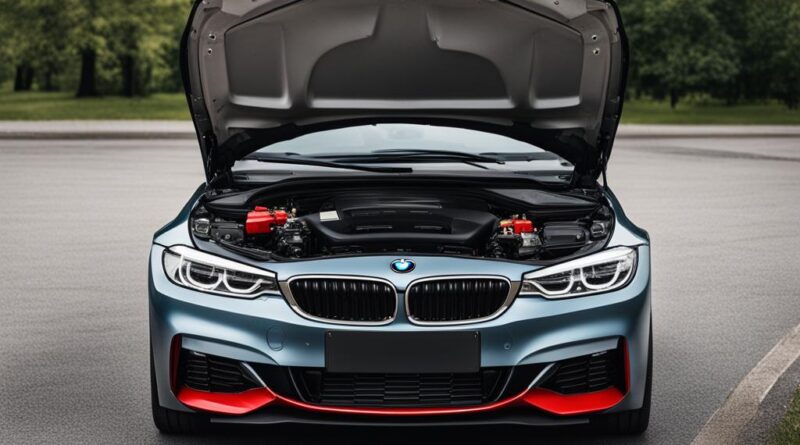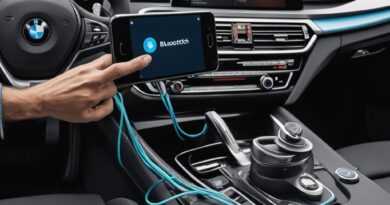Solving BMW Increased Battery Discharge Issue
Are you experiencing increased battery discharge issues in your BMW vehicle? If so, you’re not alone. BMW battery problems, such as rapid battery drain, can be frustrating and inconvenient. Fortunately, there are solutions and preventive measures you can take to resolve and avoid these issues.
The first step in troubleshooting BMW battery discharge is understanding the common causes. Some of the factors that can contribute to increased battery drain include an old or weak battery, improper charging system function, leaving the vehicle in a low charge state for extended periods, and various electrical issues.
To diagnose and resolve the increased battery discharge issue, it is essential to check the battery’s state of charge and age, ensure the proper functioning of the charging system, and use a full system scanner for accurate diagnosis. By identifying the root cause, you can take proactive measures to prevent the issue from recurring.
In this article, we will delve into the specifics of BMW battery discharge issues, their common causes, troubleshooting methods, and tips for preventing battery drain. Whether you’re experiencing BMW battery problems or looking to avoid them, this comprehensive guide will provide you with the necessary insights to keep your BMW’s battery in optimal condition.
Key Takeaways:
- BMW increased battery discharge can be caused by various factors, including old batteries, improper charging system function, and leaving the vehicle in a low charge state for too long.
- Troubleshooting BMW battery discharge involves checking the battery’s state of charge and age, ensuring the charging system functions correctly, and using a full system scanner for diagnosis.
- Preventing BMW battery discharge can be achieved through adjusting driving habits, reducing accessory usage, and properly maintaining the battery.
- Signs of BMW battery discharge include warning messages, flickering instrument clusters, and electrical malfunctions.
- If troubleshooting steps don’t solve the problem, consulting a professional technician for further diagnosis and repair is recommended.
Understanding the Increased Battery Discharge Feature in BMW Vehicles
Certain BMW vehicles have a secondary battery, known as an auxiliary battery, which powers specific systems like infotainment or navigation. The Increased Battery Discharge feature allows the driver to discharge this auxiliary battery at a higher rate than normal when the main engine is turned off. This is a normal function designed to preserve the battery’s charge during stationary periods and ensures the quick charging of the main battery. Once the increased battery discharge issue is resolved, normal operation of affected systems should resume.
Common Causes of BMW Battery Drain
When experiencing increased battery discharge in your BMW vehicle, there are several common causes to consider. These include:
1. Old or Defective Battery
An aging or faulty battery is a frequent culprit of battery drain issues. Over time, batteries lose their capacity to hold a charge effectively. It is important to regularly check and replace old batteries to prevent unexpected discharge.
2. Malfunctioning IBS Sensor
The Intelligent Battery Sensor (IBS) measures the battery’s state of charge and controls the charging system. A defective IBS sensor can cause inaccurate readings, leading to battery drain. Proper diagnosis and replacement of the IBS sensor are necessary in such cases.
3. Poor Ground Connection
A weak or faulty ground connection can disrupt the flow of electrical current, resulting in excess drain on the battery. Thoroughly inspecting and repairing any damaged or loose ground connections can resolve this issue.
4. Excessive Current Draw from Modules
Modules within the vehicle, such as the Electronic Damper Control (EDC) module or Comfort Access (CA) module, can malfunction and draw excessive current from the battery. Identifying and repairing faulty modules is essential to prevent battery drain.
5. Loose Battery Contact
A loose or corroded battery connection can cause intermittent electrical contact, leading to battery drain. Ensuring the battery terminals and cables are clean, tight, and free of corrosion can rectify this issue.
6. Excessive Electrical Demand
High electrical demand from features like heated seats, audio systems, or lighting can overload the battery and cause drain issues. Managing the usage of power-hungry electrical components can help prevent excessive battery discharge.
7. Electronic Devices Plugged into 12-Volt Outlet
Leaving electronic devices plugged into the 12-volt outlet, such as phone chargers or portable refrigerators, can drain the battery. It is advisable to disconnect or turn off these devices when the vehicle is not in use.
Identifying and addressing these common causes of battery drain can help resolve the increased battery discharge issue in your BMW vehicle. By taking prompt action, you can prevent further battery-related complications and ensure optimal performance.
Troubleshooting BMW Battery Discharge Issues
When facing BMW battery discharge issues, it’s essential to follow a systematic troubleshooting process to identify and resolve the underlying problems. By checking the battery, testing the charging system, identifying parasitic loads, updating the software, checking for error codes, ensuring proper battery registration, and considering professional diagnosis, you can effectively address battery discharge concerns.
Here are the key steps to troubleshoot BMW battery discharge issues:
- Check the Battery: Start by inspecting the condition and charge level of both the main and auxiliary batteries. This will help determine if the battery is the source of the discharge problem.
- Test the Charging System: Ensure that the charging system is functioning properly. Use appropriate diagnostic tools to assess the system’s voltage output and overall performance.
- Identify Parasitic Loads: Disconnect any aftermarket devices that might be causing parasitic loads, as they can drain the battery even when the vehicle is not in use.
- Update Software: Check for software updates provided by BMW, as they may address known battery discharge issues. Updating the vehicle’s software can help resolve the problem.
- Check for Error Codes: Use a diagnostic scanner to check for error codes related to the battery or charging system. This will provide valuable insights into any underlying problems.
- Battery Registration: After replacing the battery, ensure that it is properly registered with the vehicle’s electrical system. Battery registration allows the vehicle to recognize the new battery and helps optimize performance.
- Consider Professional Diagnosis: If the troubleshooting steps mentioned above do not resolve the battery discharge issue, it is advisable to consult a professional technician who specializes in BMW vehicles. Their expertise and advanced diagnostic tools can help identify and address complex issues.

Tips to Prevent BMW Battery Discharge
Preventing BMW battery discharge is crucial for maintaining the longevity and reliability of your vehicle. By adopting certain driving habits, reducing accessory usage, and taking proper care of your battery, you can minimize the risk of unexpected discharge issues.
Adjust Driving Habits
One of the key factors affecting battery discharge is driving habits. Consider the following tips to prevent excessive battery drain:
- Take longer trips: Short drives provide limited charging time for the battery. To ensure sufficient charging, plan longer trips whenever possible.
- Idle after short drives: Allowing your BMW to idle for a few minutes after short drives gives the alternator enough time to recharge the battery.
- Avoid frequent starts and stops: Constantly starting and stopping your vehicle puts a strain on the battery. Whenever safe and feasible, try to minimize frequent stops.
Reduce Accessory Usage
The electrical accessories in your BMW can consume a significant amount of battery power. To prevent battery discharge, consider the following:
- Minimize accessory usage: Limit the use of power-hungry accessories like heated seats, defrosters, and high-power audio systems.
- Unplug electronic devices: If you have any devices plugged into the 12-volt outlet, unplug them when not in use to avoid unnecessary power drain.
Disable Auto Start/Stop Feature
Many BMW vehicles feature an auto Start/Stop system that temporarily shuts off the engine when the vehicle is at a complete stop. While this feature helps conserve fuel, it can put additional strain on the battery. If you experience battery discharge issues, consider disabling this feature to reduce the load on the battery.
Proper Battery Maintenance
Regular battery maintenance is essential for preventing unexpected discharge problems. Here are some maintenance tips to consider:
- Check battery age and charge: Regularly inspect the battery’s age and state of charge. If the battery is old or weak, consider replacing it to prevent potential discharge issues.
- Keep the battery clean: Ensure the battery terminals are free from corrosion and dirt. Regularly clean them using a battery terminal cleaning brush.
- Inspect the battery for damage: Check the battery for any signs of damage or leakage. If you notice any issues, have the battery inspected by a professional.
By following these tips and adopting good battery maintenance practices, you can significantly reduce the risk of BMW battery discharge issues and ensure that your vehicle’s electrical systems operate smoothly.
Signs and Symptoms of BMW Battery Discharge
When it comes to BMW battery discharge issues, there are several warning signs and symptoms that you should be aware of. These indicators can help you identify whether your vehicle is experiencing battery drain problems. Here are some common signs to look out for:
- Battery Discharge Warning Signs: One of the most obvious signs of battery discharge is receiving warning messages such as “Increased battery discharge when stopped” or “Battery discharging while stopped.” These notifications indicate that your battery is not holding a charge as it should.
- Flickering Instrument Cluster: If you notice that your instrument cluster, including the lights and gauges, is flickering or behaving erratically, it could be a sign of battery discharge. This can occur when the battery is not supplying enough power to the electrical system.
- Electrical Malfunctions: Another symptom of battery discharge is experiencing electrical malfunctions in your BMW. These malfunctions can manifest as the malfunctioning of various electrical components, such as power windows, radio, or headlights. If you notice these issues, it’s essential to check your battery’s condition.
- Car Shutting off While Driving: One of the most alarming signs of battery discharge is your car shutting off unexpectedly while you’re driving. This can happen if the battery is not supplying enough power to the engine. If this occurs, it’s crucial to have your battery and charging system checked immediately.
- Charge Battery Warning: Your BMW may display a “Charge Battery” warning on the instrument cluster. This warning is an indication that your battery is not receiving the necessary charge and requires attention to avoid further discharge issues.
- Service Vehicle Icon: Another visual indicator of battery discharge is the appearance of the “Service Vehicle” icon on your BMW’s dashboard. This icon suggests that there is a problem with the vehicle’s electrical system, and the battery could be the root cause.
- Increased Battery Discharge When Stopped: If you notice that your battery is discharging at an increased rate when your vehicle is stopped or parked, it’s a clear sign of battery drain. This can occur due to a faulty battery or other electrical issues.
- Electronic Consumers Turned Off: In an effort to conserve battery power, BMW vehicles may temporarily turn off certain electronic consumers or reduce their functionality. If you find that your electronic devices or systems are unexpectedly turned off or not working correctly, it could be an indication of battery discharge problems.

Understanding these signs and symptoms can help you diagnose battery discharge issues in your BMW. If you experience any of these warning signs, it’s essential to seek professional assistance to diagnose and resolve the underlying problem.
Common Issues with BMW Battery Drain
When it comes to BMW battery drain, there are several common issues that can contribute to this problem. Understanding these issues can help BMW owners diagnose and address battery drainage effectively. Some of the common issues include:
- Battery age and capacity: Over time, batteries in BMW vehicles can lose their capacity to hold a charge, especially as they age. Old batteries may not be able to supply sufficient power to meet the electrical demands of the vehicle.
- High energy consumers: Certain components in BMW vehicles, such as heated seats and defrosters, consume a significant amount of electrical power. These high energy consumers can contribute to faster battery drain, especially if used extensively.
- Faulty IBS sensor: The Intelligent Battery Sensor (IBS) in BMW vehicles is responsible for monitoring and regulating the battery’s charging and discharging processes. A faulty IBS sensor can cause inaccuracies in the battery’s state of charge, leading to unexpected battery drain.
- Programming updates: Sometimes, BMW releases programming updates to address specific battery drain issues. These updates may adjust the computer’s sensitivity to certain electrical systems, optimizing power usage and reducing unnecessary battery drain.
- Defective modules: BMW vehicles have various modules that control different systems, such as the Comfort Access (CA) module or the Electronic Damper Control (EDC) module. If any of these modules become defective, they can draw abnormal amounts of current from the battery, resulting in faster battery drain.
By addressing these common issues related to BMW battery drain, owners can effectively mitigate battery discharge problems and ensure reliable vehicle performance.
Conclusion
Solving BMW’s increased battery discharge issue requires a combination of prevention, troubleshooting, and maintenance. By understanding the causes, signs, and common issues related to battery drain, BMW owners can take proactive measures to prevent battery discharge problems. Adjusting driving habits, such as taking longer trips or minimizing accessory usage, can help preserve battery charge. Proper battery maintenance, including regular checks of battery age and charge, is essential to prevent unexpected discharge issues.
In cases where battery discharge occurs, troubleshooting the issue is crucial. Checking the condition and charge of both the main and auxiliary batteries, testing the charging system, and identifying and disconnecting any aftermarket devices causing parasitic loads can help resolve the problem. Updating the vehicle’s software or consulting a professional technician for further diagnosis and repair may also be necessary.
By following these preventive measures and troubleshooting steps, BMW owners can ensure their vehicles operate smoothly without battery discharge issues. Proper battery maintenance, understanding the increased battery discharge feature, and addressing common causes of battery drain can go a long way in preserving battery life and the overall performance of BMW vehicles.
FAQ
What causes the “Increased battery discharge while stationary” warning in BMW vehicles?
The warning message can be triggered by an old or weak battery, improper charging system function, or leaving the vehicle in a low charge state for too long.
What is the purpose of the Increased Battery Discharge feature in BMW vehicles?
The feature allows the auxiliary battery to discharge at a higher rate when the main engine is turned off, preserving its charge during stationary periods and facilitating quick charging of the main battery.
What are some common causes of battery drain in BMW vehicles?
Common causes include old or defective batteries, malfunctioning IBS sensors, poor ground connections, excessive current draw from modules, loose battery contact, faulty EDC modules, and defective CA modules. Electronic devices plugged into the 12-volt outlet can also contribute to battery drain.
How do I troubleshoot BMW battery discharge issues?
To troubleshoot, check the condition and charge of both the main and auxiliary batteries, test the charging system, identify and disconnect aftermarket devices causing parasitic loads, update the vehicle’s software, check for error codes related to the battery or charging system, and ensure proper battery registration after replacement. Consulting a professional technician may be necessary for further diagnosis and repair.
What can I do to prevent battery discharge in my BMW?
Adjusting driving habits, such as taking longer trips or allowing the car to idle after short drives, minimizing accessory usage, and disabling the auto Start/Stop feature can help preserve battery charge. Proper battery maintenance, including regular checks of battery age and charge, is also important.
What are some signs and symptoms of BMW battery discharge?
Warning messages like “Increased battery discharge when stopped” or “Battery discharging while stopped,” flickering instrument cluster, electrical malfunctions, the car shutting off while driving, charge battery warnings, service vehicle icons, and temporary switch-off of electronic consumers are common signs of battery discharge.
What are some common issues related to BMW battery drain?
Common issues include older batteries with reduced capacity, high energy consumers like heated seats and defrosters, faulty IBS sensors, programming updates to adjust computer sensitivity, and defective modules causing abnormal current draw.
How can I solve the increased battery discharge issue in my BMW?
Solving the issue requires a combination of prevention, troubleshooting, and maintenance. By adjusting driving habits, properly maintaining the battery, and seeking professional help when necessary, BMW owners can ensure their vehicles operate smoothly without battery discharge problems.




